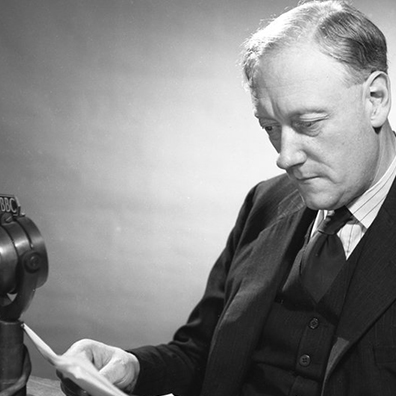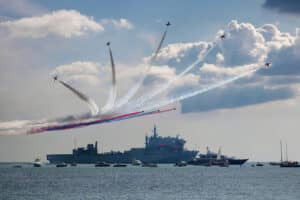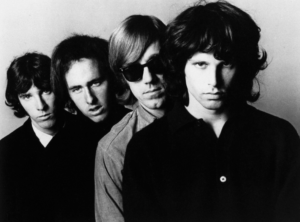

Length: 1850 words/9 minutes
“There were great numbers of young men who had never been in a war and were consequently far from unwilling to join in this one.”
These words, chiseled into one of the walls at the Imperial War Museum in London, were written sometime in the 5th century B.C. by the great Greek general and historian Thucydides. 2,500 years later we find that young men and women still gather to hear of their elders’ adventures in the military. Not all who listen of course heed the call to join, but for those who do, Thucydides would not at all be surpirsed—he knew the attraction.
Thucydides was the writer who chronicled the Peloponnesian War—the lengthy conflict between Sparta and Athens that is the prisim through which we have viewed all the world’s conflicts since. It is hard to imagine where we would be without his writings—they simply are that important to not only understanding the events of that time, but also the human behavior and nature that altered their course.
He is back in the limelight as today’s politicians and strategists speak of a “Thucydides trap” that could portend was between the United States and a rising China. I find it remarkable that a writer living in the Bronze Age is very much guiding the leading thinkers of two superpowers whose technological, military, and economic reach straddles the planet.
But it is Thucydides’ remark about how young men (and today we very much include young women) think of war that has always struck the deepest chord. He knew that a certain portion of the young would keenly listen to the veterans as they told their tales of being tested in conflicts near and far.
So it is not really all that odd that I would think of Thucydides during a recent trip to Nashville, Tennessee. The reason that he, instead of music, came to mind is that I was attending the 30th reunion of my Air Force pilot training class. Although 2,500 years had passed, Thucydides would have recognized in the collection of middle aged men and women that we had once “been willing” and eagerly entered the military with our dreams and futures ahead of us. As we sat around the dinner table and chatted, I realized that we were now those elders to whom the next generation would listen for their inspirations. Our dreams had come true. We indeed were a lucky group.

We had, as a group, aged decently enough from our mid-1980s youth in Mississippi where we underwent our initial flight training. Our bellies still relatively slim, a bit of gray here and there, one or two already grandparents, but all as recognizable as if a week had not passed since we had seen each other.
But it was not appearances that any of us were interested in. Pilots are
Pilots get a bad rap on occasion for being too sure of themselves—arrogant in the eyes of some. But as I looked around the table at dinner I saw no ego at all. Instead, there was a relaxation born of a quiet confidence and dedication to
Whatever ego there might have been in our younger days had long been
There is a great deal of subtlety in Morgan’s comments and it takes a moment to grasp what he was really trying to say. As we sat in the comfort of Nashville and relived the difficulties of our year in military pilot training (and hard it was indeed!), I could see that the Air Force had instilled exactly what Morgan was advocating—that quiet assurance that is willing and eager to assume responsibility. Not a showy “I can do it” aura, but instead a “getting cracking” with the task at hand. I admired this trait when I first started to fly and I still do.
Now before the reader thinks that I am giving us too much credit I readily admit that I am the least of this group. But it is a refreshing change to be among those in whom excuses are neither expected nor offered. These are men and women who you can count on. I know this is a phrase that is often bandied about, but as I looked around the table I knew I was looking at a good example of it.
A good number of my colleagues stayed in the reserves after their active duty commitment was up. While I retired a humble Lt. Colonel, a handful of our ranks reached the rank of full Colonel and two even wear the stars of a General Officer.
So while we were able to fulfill our dreams of flying and enjoyed it mightily, it was clear that Uncle Sam had indeed gained a lot of work for his investment. We were fortunate that our wars and time in the cockpit were not fraught with the losses in the air that previous generations of military and civilian aviators had suffered—in fact we had not lost anyone to
It is only now that I can look back and see what leadership traits were in play to not only make learning to fly military aircraft a tough process, but also to keep up the motivation so that enough of us would graduate to keep the pipeline full of qualified pilots. A deft balance at times to be sure.
I remember one afternoon before pilot training when I was still in Officer School when a full Colonel came to talk to those of us who would be going on to flight school. Now, this was in 1986 and not all that far from Vietnam—which is exactly where this Colonel had honed his initial military flying skills.
He was a mild-mannered, almost bureaucratic officer, but at the end of his speech he looked at us and said, “If you ain’t a pilot you ain’t shit!” The auditorium exploded with cheers as we jumped to our feet as he left the stage. I remember it as if it were yesterday. He knew how to move an audience.
Of course in the cool rationality of today such words would never be uttered, but in the middle of the Cold
Obviously, as life progressed we learned that the good Colonel had taken quite a bit of latitude with his words and that they were a gross exaggeration. It goes without saying that we soon learned that wonderful people, our betters in so many ways, were all around us every day doing everything from loading trucks on the dock to being chief of surgery at a large metropolitan hospital. Hard to grasp though when one is only 22.
Yet in hindsight it is clear that the Colonel’s job was to ignite the dynamite that he had put under us and to make us start to think of the responsibilities that lay ahead—flying is just too full of pitfalls to be going in with anything less than the “A” game. He did not want us to be what Len Morgan was warning us about—of showing up with so much self-doubt that it would be better not to be climbing into a cockpit.

Yet we had our share of uncertainty. Panama, Gulf Wars I and II, Somalia, Afghanistan, and many more times when we said goodbye to loved ones not knowing when we might be back. In some ways it could be surreal—one day at home coaching a baseball game and twenty-four hours later flying into a rough corner of the world. I remember flying an airline trip one night and as we were over the North Atlantic and chatting to pass the time, I learned the other copilot had been flying A-10s in combat in Afghanastan merely a week before! It was a juxtaposition that could not be starker—both new to our modern age and just as bewildering.
As I looked at my colleagues I recognized that they had all been dedicated to our country—and continue to be so in their civilian roles—whether that it is flying passengers comfortably to Beijing or in other walks of business and industry. They might not think of it, but they kept the faith and they still do.
Time teaches many lessons, among them of course is humility, but one of the most important is that we are merely a continuum. The past rolls into the present which rolls into the future. Our task is to keep alive the flames of our piloting craft, our citizenship, and our idea of dedication for the next generation.
For now it is that younger generation who will sit and listen to our voices just as Thucydides described. They will hear our stories and be “not unwilling” as he phrased it. The fights and adventures are no longer ours but theirs.
My colleagues did well and I admire them for it. I have no doubt the next generation will do the same.
In the meantime, stay average!
![]()







This is when I always remind my fellow military pilots to please go read Gen Jimmy Doolittle’s autobiography (I Could Never Be So Lucky Again)if you haven’t already. The most humble, illuminating aviation book of my generation.
Neal,
Insightful and inspiring ! I count my self as one of the lucky ones who spent that traumatic year in Mississippi with you and the rest of our brothers and sister. I will have my son, who just started flying for a regional airline, read this essay. BTW, you were one of the few who attained a high ranking in our class, far from “the least” of us.
Ciro